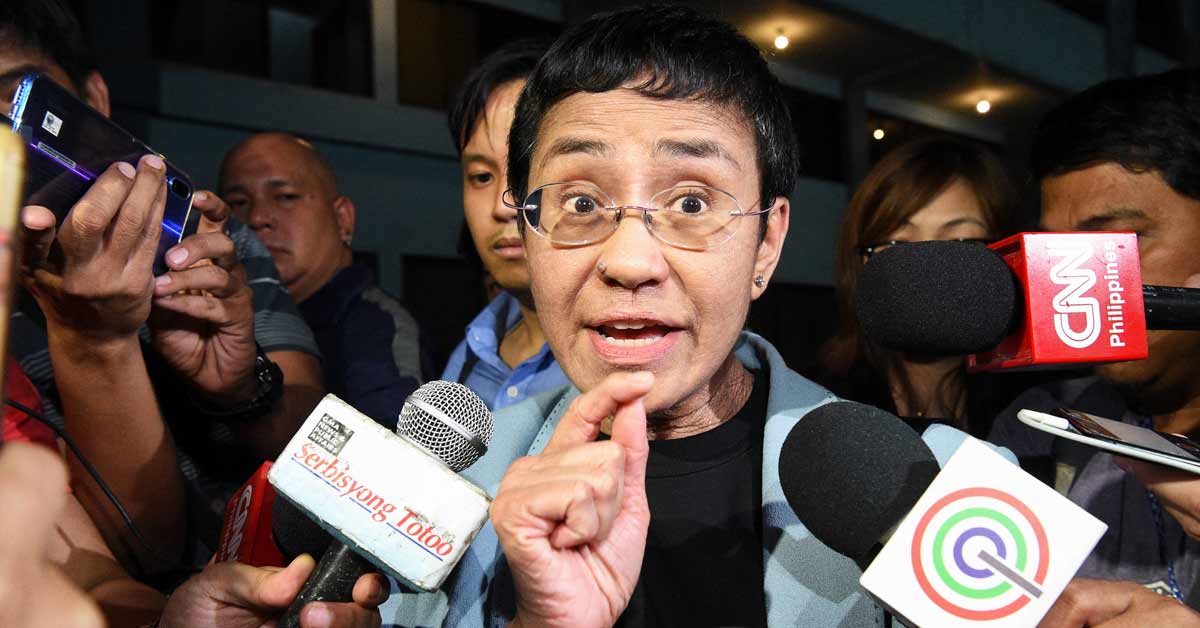When Filipina Hidelyn Diaz won a Gold Medal at the 2020 Tokyo Olympics – which ended the Philippines’ 97-year Olympic gold medal drought – there was an outburst of exultation, joy, and national pride in the Philippines and among Filipinos all over the world. The Filipino diaspora exploded with elation and euphoria upon knowing of Diaz’s historic achievement of winning the elusive gold medal in Tokyo.
Congratulatory and laudatory messages and expressions of national pride for Diaz dominated Filipino and even non-Filipino social media feeds. It was indeed not only a crowning moment for the Philippines. Filipinos from different walks of life and different political leanings, backgrounds, and beliefs were one and in unison in celebrating the victorious moment of the Filipina weightlifter.
On the contrary, there was no spur-of-the-moment, natural and unprompted deluge and outpouring of joy and national pride in the Philippines for Maria Ressa of Rappler when it was announced that she had won the 2021 Nobel Peace Prize.
Except for a few, the majority of Filipinos didn’t care about Ressa winning a Nobel Peace Prize. Many instead expressed disdain, disapproval and pointed out that Maria Ressa is a phony not deserving and worthy of such an accolade. Why is that?
Underserved Nobel Prize
Many in the country including prominent, multi-awarded, and well-respected journalists like Former Ambassador Rigoberto Tiglao and Francisco Sionil José, the country’s National Artist for Literature and Ramon Magsaysay Awardee for Journalism, Literature and Creative Communication Arts have expressed that Maria Ressa of Rappler is not worthy of such a prize.
F Sionil José said, “Maria Ressa does not deserve the Nobel. I have criticised Duterte but not on press freedom. The Philippine press is alive and well not because of Maria Ressa. No writer is in jail. There is no censorship. Duterte hasn’t closed a single newspaper or radio station. The closure of ABS-CBN was made by Congress which did not renew the ABS-CBN franchise. Sure, he influenced Congress but the real issue against ABS-CBN as I have pointed out is not press freedom but money, politics, power, and its abuse by the Lopezes who own the TV network. Sure, journalists have been killed during the Duterte regime just as it was in past administrations. But those killings cannot be laid at Duterte’s door. Usually, they are made by minor politicians or officials attacked by journalists.”
The 96-year-old national artist also implored, “What heroic sacrifice has Maria Ressa done for freedom and the Philippines? And who is funding her?”
By the same token, former Ambassador Tiglao in his Manila Times column published on 11 October 2021 titled, “US Uses Nobel Prize to Demonize Duterte, and Therefore His Successor stated, “Ressa was awarded not for any work of journalism but entirely on her portrayal of herself as a crusader for press freedom in the Philippines, which she claims President Rodrigo Duterte has been suppressing. She is a master of the sound bite, spewing such obvious lies that tug at Americans' hearts such as her claim that for criticising Duterte, she had received at one point "90 hate messages an hour, 90 rape threats per minute. The claim of press suppression in the country is just astonishing as anyone can simply scan the newspapers here and find that many are more vicious in criticising Duterte than Rappler, yet are not complaining over press suppression.”
Tiglao further elucidated in the same article that, “Killings of journalists, according to a detailed case-to-case investigation of the Presidential Task Force on Media Security, weren't related to their work. In the very few cases that were, the people who ordered their murder were drug lords or municipal-level political kingpins they run into trouble with.”
According to a UNESCO monitoring body, there were 16 journalists killed during the Duterte administration. Under Benigno Aquino III, there were 27.
Tiglao further contended that “The Philippines has, in fact, the freest – and probably most powerful – press in the world. Ressa's website, initially funded by tycoon Benjamin Bitanga and then by Central Intelligence Agency (CIA)-linked US entities, the National Endowment for Democracy and the Omidyar Network, has become one of the bigger websites since Duterte assumed office in 2016. How in the world could it have been suppressed?”
Tiglao in the same article also shed light on the inaccurate reporting and overblown number of casualties and fatalities as purported by Maria Ressa and Rappler on the global stage about the Duterte administration’s campaign against illegal drugs, more popularly known as the “War on Drugs” by deceitfully and fraudulently depicting the current administration as waging a war against its populace. This seems to be the primordial consideration why the Nobel Prize committee decided to bequeath such an award to Ressa.
Tiglao also stated in his article that “the accurate figure, which hasn't been disproved by actual facts despite several efforts by non-governmental organisations (NGOs) and two universities, is around 6,600 since 2016. That is way fewer than the 30,000 to 40,000 killed in state campaigns against illegal drugs in Mexico and Colombia.
The casualties have in fact gone down so much in the past two years that not even the opposition dare use Duterte's anti-drug war as a major issue in its anti-Duterte campaign since most Filipinos are grateful that the campaign has vastly curbed the illegal drug problem in the country.
The figure of over "27,000" killed, which the Left and the opposition have succeeded in spreading all over the world, and which the Nobel Committee apparently believed, was one concocted by Rappler. It deliberately misinterpreted the number of total homicides (due to any reason including passion killing, for example) being investigated by the police as due to the drug war.”
Hindsight And Perspective
The concept of an award is not unfamiliar to Filipinos as basically, we have as many awards for every facet of our social lives – from local films, mass media, arts, sciences, and awards on good governance including the prestigious Ramon Magsaysay Award, which to a considerable degree is considered as the equivalent or the Asian version of the Nobel Prize.
Filipinos from all walks of life rejoice and celebrate every time a Filipino receives recognition that brings honour and prestige to the country either locally or internationally, be it in the fields of arts, music, beauty pageants, leadership, and the like.
But the same can’t be said with Maria Ressa of Rappler winning the Nobel Prize. Except for a few, many in the country are aghast and appalled by Maria Ressa winning such a prize. Why? Frankly, because she simply does not personify someone who takes the tall order of upholding integrity and credibility. She does not anthropomorphise and characterise someone who upholds the sacrosanctity of facts and truth. Most of all, she does not exemplify the genuine and authentic role that journalists play in a democracy like the Philippines.
The Rappler CEO and Rappler for that matter are purveyors of fake news and bad journalism in the Philippines. Aside from the fact that Maria Ressa faces a tax evasion case alongside other criminal cases pending in Philippine courts, she has been convicted of cyber libel filed by Mr Wilfredo Keng.
RTC Branch 46 of Manila convicted Maria Ressa and Reynaldo Santos Jr of violating Section 4(c)(4) of the Republic Act. No. 10175, otherwise known as the “Cybercrime Prevention Act of 2012.”
The conviction of Maria Ressa is not an issue per se of press freedom or the suppression of such freedom, but rather is an issue of “bad journalism and fake news,” and the rule of law. Fake news and bad journalism are the antitheses of media freedom and are threats to the flourishing of democracy in a country. One has to understand that fake news and bad journalism are the “contrivance of duplicity,” and are the complete opposite of legitimate news and the ethical exercise of good journalism.
Likewise, Rappler and Maria Ressa violated Philippine Laws and the Constitution of the country more particularly the constitutional ban on foreign ownership by allowing a US-based investor to participate in its operations. Article XVI Section 11(1) of the Philippine Constitution mandates that the control and management of mass media be limited to 100 percent ownership by Filipinos.
In a decision made public in March 2019, the Court of Appeals said that Rappler effectively allowed US-based investor Omidyar Network “to participate” in its corporate actions and decisions in violation of the constitution, which requires media companies to be fully owned and managed by Filipinos. The court in effect backed the Securities and Exchange Commission’s (SEC) decision to revoke Rappler’s license.
These court rulings, in many ways, have time and again proven that no one and no entity is above the law and the constitution. These served as reminders that there’s no such thing as absolute freedom of the press when the holder of that freedom violates the constitution, which is the fundamental law of the land, and the country’s existing laws and regulations.
Moreover, it is but farcical for the Nobel Prize committee to bestow Maria Ressa an award painting her as a champion of press freedom in the Philippines when Ressa’s online news site Rappler, thus far, is the least trusted media organisation in the country.
Based on the PUBLiCUS Asia Inc. second-quarter poll, which was a nationwide purposive sampling survey comprising 1,500 respondents drawn from a research panel of approximately 100,000 Filipino registered voters conducted from 13-19 July, 2021 and published on 13 August, 2021, Rappler and ABS CBN (online) garnered the highest total low trust ratings.
Conclusion
Hence, winning an award at the expense of the country by painting it black and putting the country in a bad light on the global stage is not heroic at all. There’s nothing glorious about it. It’s more like “selling one’s soul to the devil.”
At the end of the day, what makes an award and its recipient worthy of adulation and respect is if there’s integrity and credibility in both. Alas, except for a few, Maria Ressa will not reap the prestige, honour, appreciation, and respectability being accorded to other Filipinos who have won awards and accolades both locally and internationally for the very reason that she has won the award by defaming and vilifying her country on the global stage.
The views expressed in this article are the author’s own and do not necessarily reflect those of The ASEAN Post.

